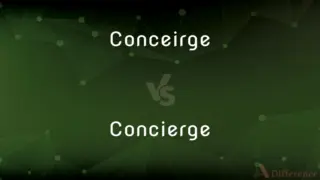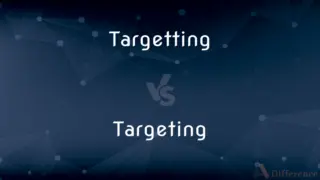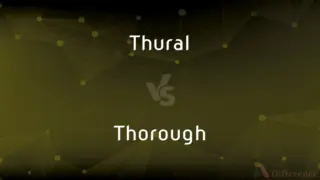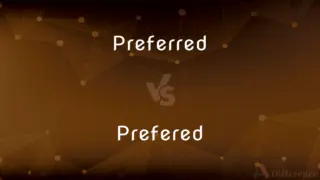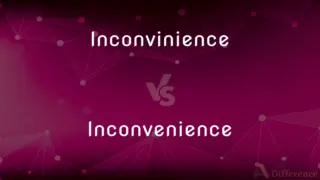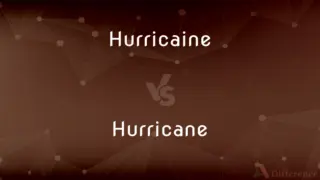Comming vs. Coming — Which is Correct Spelling?
By Tayyaba Rehman — Updated on July 21, 2024
"Coming" refers to the action of approaching or moving towards a particular place or event. "Comming" is not a correct spelling in English.
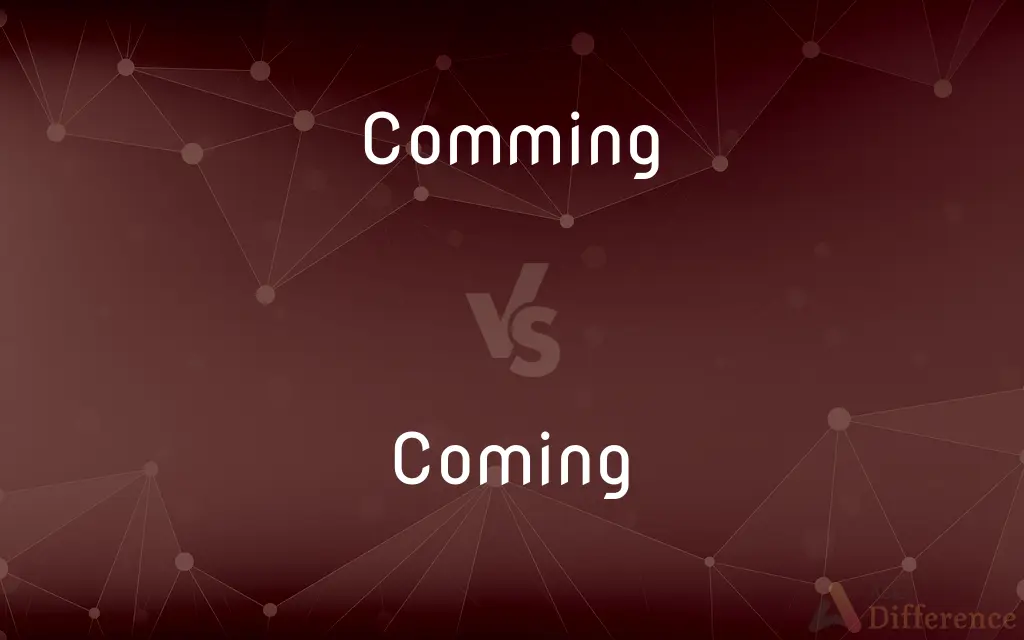
Table of Contents
Which is correct: Comming or Coming
How to spell Coming?

Comming
Incorrect Spelling

Coming
Correct Spelling
ADVERTISEMENT
Key Differences
"Coming" is a standard English term. It's the present participle of "come," meaning to move or travel toward or into a place. "Comming" isn't recognized as a valid word in the English language.
The word "coming" is versatile, used to describe anything from physical movement towards a location to the occurrence of an event in the near future. "Comming" is a common misspelling of "coming."
Remember "coming" has one "m" in the middle, not two.
Avoid spelling it as "comming"; it’s "coming" with a single "m."
To avoid confusion and maintain effective communication, it's crucial to use "coming" correctly. In contrast, "comming" should be avoided to prevent misinterpretation.
ADVERTISEMENT
Think of "come" plus "ing" to form "coming."
Visualize "coming" as approaching, with "ome" turning into "oming."
The word "coming" has six letters, ending with "ing."
How Do You Spell Coming Correctly?
Incorrect: She kept comming up with new ideas for the project.
Correct: She kept coming up with new ideas for the project.
Incorrect: Are you comming to the meeting tomorrow?
Correct: Are you coming to the meeting tomorrow?
Incorrect: The rain is comming down pretty hard outside.
Correct: The rain is coming down pretty hard outside.
Incorrect: I think he’s comming down with a cold.
Correct: I think he’s coming down with a cold.
Incorrect: Comming to the party tonight would be a lot of fun.
Correct: Coming to the party tonight would be a lot of fun.
Coming Definitions
The act of approaching or moving towards.
The train is coming towards the platform.
About to arrive or happen.
The coming election will be crucial for the country.
The arrival or advent of something or someone.
His coming to the party surprised everyone.
The action of arriving at a specified place.
She is coming to the party tonight.
The act of drawing spatially closer to something.
The hunter's approach scattered the geese.
To reach a particular state or action.
If you keep working hard, success is coming your way.
Approaching; forthcoming; next.
The coming season.
A coming report on arms limitation.
Showing promise of fame or success.
Arrival; advent.
The coming of spring.
Present participle of come.
The act of arriving; an arrival.
Approaching; of the future, especially the near future; the next.
See you the/this Sunday coming!
She will have two or three paintings in the coming exhibition.
Newly in fashion; advancing into maturity or achievement.
Ergonomic wallets are the coming thing.
(obsolete) Ready to come; complaisant; fond.
Approaching; of the future, especially the near future; the next; as, the coming week or year; the coming exhibition.
Welcome the coming, speed the parting, guest.
Your coming days and years.
Ready to come; complaisant; fond.
Approach; advent; manifestation; as, the coming of the train.
Specifically: The Second Advent of Christ, called usually the second coming.
Arrival that has been awaited (especially of something momentous).
The temporal property of becoming nearer in time.
Of the relatively near future.
This coming Thursday.
The forthcoming holidays.
The upcoming spring fashions.
Yet to come.
Coming generations.
Coming Meaning in a Sentence
Are you coming to my birthday party next week?
He's coming back from vacation tomorrow.
They were coming down the hill when it started to rain.
The train is coming into the station right now.
She is coming over to study with me this afternoon.
My relatives are coming for dinner on Sunday.
We saw the storm coming and found shelter.
I heard them coming before I saw them.
Spring is coming, and the flowers will start to bloom.
The cat keeps coming back to our house.
Winter is coming, so we need to prepare.
The new movie is coming out next month.
My favorite season is coming up soon.
They're coming together to solve the problem.
The holidays are coming, and everyone is excited.
The teacher is coming to help us with our project.
The mailman is coming down the street.
The bus is coming; we should get ready to board.
He was coming to a realization about his mistake.
The deadline is coming up, so we need to hurry.
Are the new students coming to our school?
I'm coming to see the value of hard work.
I'm coming to understand the importance of exercise.
She's coming to pick up her books later.
The birds are coming back north for the summer.
Coming Idioms & Phrases
Coming to a head
Reaching a point where a situation is so critical that it must be dealt with immediately.
The disagreement between the two departments is coming to a head and needs resolution.
Coming into one's own
Gaining confidence and becoming more effective in what one does.
After years of practice, he is finally coming into his own as a painter.
Coming of age
Reaching a certain age where one is legally recognized as an adult.
His coming of age party was a huge celebration.
Coming to light
Becoming known or apparent.
New evidence is coming to light that may change the outcome of the trial.
Coming full circle
Returning to the original position or state of affairs after a series of changes.
After traveling the world, she found herself coming full circle back to her hometown.
Coming up roses
Turning out very well; successful or satisfactory.
Despite the challenges, everything is coming up roses for the new business.
Coming clean
Admitting something or confessing.
He decided it was time to come clean about his mistakes to his family.
Coming down the pike
Something that is going to happen in the future.
There are several new projects coming down the pike for our team.
Coming to terms with
Accepting a difficult or unpleasant situation.
She is coming to terms with the fact that she needs to find a new job.
Coming apart at the seams
Starting to fail or collapse.
The project was coming apart at the seams until the new manager took over.
Common Curiosities
What is correct spelling of comming?
The correct spelling is "coming."
What does comming on mean?
The correct term is "coming on," which typically refers to the onset or beginning of something, or in a social context, it may refer to someone making advances or showing interest.
Is coming a verb or adjective?
"Coming" is a verb. It's the present participle of "come."
Is it comming back or coming back?
The correct term is "coming back."
How do you spell I'm coming?
"I'm coming" is the correct spelling.
What does my time is coming mean?
"My time is coming" means a person's opportunity or moment of importance or success is approaching.
How do you use coming in a sentence?
In a sentence: "My parents are coming to visit next week."
What is the coming of age in Islam?
In Islam, the coming of age is referred to as the age of maturity or "bulugh," which is generally recognized at puberty.
What is the verb of coming?
The verb of "coming" is "come."
Why do people like coming of age?
People often like "coming of age" stories because they relate to the universal experience of growing up and the challenges and discoveries that come with it.
What is a coming day?
A "coming day" refers to a future day or time.
What is coming of age also called?
"Coming of age" is also referred to as "reaching adulthood" or "attaining maturity."
What's another word for coming soon?
"Arriving soon" or "imminent" can be used as synonyms for "coming soon."
What does no coming back mean?
"No coming back" means that a decision, action, or situation is irreversible and cannot be undone.
What is the past form of coming?
The past form of "coming" is "came."
Is when are you coming correct?
Yes, "when are you coming" is grammatically correct.
Is it correct to say are you coming tomorrow?
Yes, "are you coming tomorrow" is a correct and common way to confirm someone's plans.
What is the idiom up-and-coming?
The idiom "up-and-coming" refers to someone who is showing signs of advancement and is likely to achieve success or prominence in their field.
What is the form of coming?
"Coming" is the present participle form of the verb "come."
Are you coming or are you not coming?
This is a way to ask for confirmation about someone's plans to arrive at a place.
What is a way to say coming from?
One way to say "coming from" could be "originating from."
What is the meaning of coming go?
"Coming and going" is a phrase often used to denote movement, activity, or fluctuation in a particular area or context.
What is coming for age?
"Coming of age" refers to the transition from childhood to adulthood.
How do you thank someone for coming formally?
In a formal setting, you might say, "I deeply appreciate your presence here today."
What is a word for not coming?
A word for "not coming" could be "absent" or "not arriving."
Will you be coming tomorrow or will you come tomorrow?
Both phrases are correct, asking about someone's intention to arrive the next day.
What is the difference between where are you from and where are you coming from?
"Where are you from?" asks about one's home or place of origin. "Where are you coming from?" asks about one's immediate previous location.
How do you ask if you are coming to office?
You could ask, "Are you coming to the office today?"
What is a coming back?
"Coming back" is the action of returning to a place or situation. It can also be used metaphorically to indicate recovery or improvement.
What does coming correct mean?
"Coming correct" is a slang phrase meaning to approach or handle a situation properly or respectfully.
What does it mean when a girl says I'm coming?
When a girl says, "I'm coming," it means she's on her way or will be arriving soon.
What is a synonym for coming at?
A synonym for "coming at" can be "approaching."
Is where are you coming from correct?
Yes, "Where are you coming from" is correct and is often used to ask about someone's origin or perspective.
Is it okay to say I'm coming?
Yes, it's perfectly acceptable to say "I'm coming" to indicate you're on your way.
What is a synonym for coming an end?
A synonym for "coming to an end" could be "concluding" or "ending."
Is it coming to age or coming of age?
The correct phrase is "coming of age," which refers to the transition from childhood to adulthood.
What is the best response to thank you for coming?
A good response could be, "It was my pleasure. I had a wonderful time."
How do you ask boss if he is coming to office?
You might ask, "Will you be in the office today?"
Is coming back a phrasal verb?
Yes, "coming back" is a phrasal verb that means returning to a place or situation.
Is it thank you for coming or coming in?
Both are correct and used based on context. "Thank you for coming" is used after someone has visited, while "Thank you for coming in" is typically used in professional settings like interviews or meetings.
What is the verb for coming before?
The verb that represents coming before is "precede."
Why is it called coming of age?
It's called "coming of age" because it marks the transition from childhood to adulthood, a significant period where one comes into their own maturity and responsibility.
What is the synonym of after coming?
A possible synonym for "after coming" is "following."
What is the difference between I will come and I will be coming?
"I will come" indicates a definite plan, whereas "I will be coming" suggests a plan that's less definite or part of a larger context.
How do you ask if you are coming tomorrow?
You can ask, "Will you be coming tomorrow?"
What is the synonym of time coming?
A synonym for "time coming" could be "approaching time."
What is a synonym for coming back?
A synonym for "coming back" is "returning."
What verb is coming?
"Coming" is the present participle of the verb "come."
What is coming at someone?
"Coming at someone" usually refers to someone aggressively confronting, criticizing, or attacking another person.
Are you coming or not in English?
"Are you coming or not" is a correct phrase in English, often used to ask for confirmation on someone's plans or intentions.
What does coming first mean?
"Coming first" usually refers to being the winner or being ranked highest in a competition or ranking.
What is the second form of coming?
The second form (past simple) of the verb "come" is "came."
What does coming front mean?
"Coming front" is not a standard English phrase. Its meaning would depend on its context.
Is it correct to say come in front?
The phrase "come in front" is not commonly used. It could be correct in some contexts, such as giving directions, but usually, one would say, "come to the front."
Why do we say I'm coming?
We say "I'm coming" to indicate that we are on our way or about to arrive somewhere.
What is the same meaning of coming?
Synonyms of "coming" include "approaching," "arriving," or "on the way."
What does coming in age mean?
The correct term is "coming of age," which refers to the transition from childhood to adulthood.
What is the meaning of coming year?
The "coming year" refers to the next or upcoming year.
What is the opposite of comming?
The correct spelling is "coming." The opposite can be considered "leaving" or "going."
What is the difference between I am coming and I am going?
"I am coming" suggests movement towards a place or person, while "I am going" suggests movement away from a place or person or towards a different location.
What's another word for coming after something?
"Following" or "succeeding" can be used as synonyms for "coming after something."
Will you come or are you coming?
Both are correct but used in different contexts. "Will you come" is used to invite or request someone's presence in the future. "Are you coming" is used to ask about someone's immediate or near future plans.
Are you going with us or are you coming with us?
Both are correct, and the choice depends on the speaker's perspective. "Are you going with us" is used when the group is about to depart. "Are you coming with us" is often used when the speaker is part of the group that has already started the journey or activity.
How do you say thank you coming?
The correct phrase is "thank you for coming," which is used to express gratitude to someone for their presence at an event or place.
What does I'm coming tomorrow mean?
"I'm coming tomorrow" means the speaker plans to arrive or visit the following day.
Is it coming past or coming passed?
The correct term is "coming past," which refers to moving or going by something.
What is the coming of age in the UK?
In the UK, "coming of age" typically refers to the age of 18, when a person legally becomes an adult.
What is a vocabulary word for coming?
"Arrival" is a vocabulary word associated with "coming."
What does coming mean in slang?
In slang, "coming" can still refer to arrival or approach. However, the meaning can significantly vary depending on regional slang or the context it's used in.
Is coming an adjective?
"Coming" can be used as an adjective when it describes an approaching event or period, such as in "the coming year."
What is the difference between coming back and going back?
"Coming back" refers to returning to a current location or situation, while "going back" implies returning to a previous location or situation.
Is it correct to say I'm not coming today?
Yes, it is correct to say "I'm not coming today" when informing someone that you will not be present or arrive as previously planned.
What is the meaning of coming new?
The phrase "coming new" isn't standard in English. If you mean something that is about to arrive and is new, you might say "upcoming new" or "new and upcoming."
What is the meaning of coming last?
"Coming last" means being the final one in a series or the lowest in a ranking or competition.
What is the meaning of its coming?
"It's coming" usually means something is approaching or about to happen.
What is the meaning of coming with?
"Coming with" usually refers to accompanying someone to a place or event.
What is the English meaning of I am coming?
"I am coming" means that the speaker is on their way or will be arriving soon.
What does coming to question mean?
The phrase "coming into question" means something is being doubted or challenged.
What is the synonym of coming today?
"Arriving today" or "due today" can be synonyms for "coming today."
Are you coming here or going here?
"Coming" and "going" depend on the speaker's perspective. If you are at the location, you'd ask, "Are you coming here?" If you are not at the location, you'd ask, "Are you going here?"
How can I say I'm coming?
You can simply say, "I'm coming" or "I will be there soon" to express your imminent arrival.
What is the difference between am coming and I'm coming?
"Am coming" and "I'm coming" mean the same thing. "I'm" is the contracted form of "I am."
How do you thank someone for coming for dinner?
You can say, "Thank you for joining us for dinner. Your presence made the evening special."
Is he coming or does he come?
"Is he coming?" is about a specific occasion, while "Does he come?" refers to regular or habitual action.
What does coming for him mean?
"Coming for him" generally means someone intends to confront or attack him, either physically or verbally.
Is it correct to say where are you coming from?
Yes, it is correct to ask someone, "Where are you coming from?" if you want to know their prior location.
What is the meaning of I just coming?
"I just coming" is not grammatically correct in English. A corrected version might be, "I'm just coming," meaning the speaker is on their way or will be arriving shortly.
Who else is coming or are coming?
"Who else is coming?" is the correct form, asking about other individuals who are planning to arrive.
What is the opposite of coming?
The opposite of "coming" would be "going."
What is the meaning of a long time coming?
"A long time coming" is a phrase that means something has been awaited or expected for a very long time.
What is the meaning of coming times?
"Coming times" refers to the future or times that are yet to happen.
How do you use coming on strong in a sentence?
In a sentence: "He's really coming on strong with his sales pitch."
What is the meaning of in coming?
"Incoming" refers to something that is arriving or about to arrive.
How do you spell thanks for coming?
The correct spelling is "Thanks for coming."
Which is correct coming or going?
Both "coming" and "going" are correct, depending on the perspective. Use "coming" when moving towards and "going" when moving away from the reference point.
How do you use coming back in a sentence?
In a sentence: "She's coming back from her vacation tomorrow."
How to say I'm not coming today?
You can say, "Unfortunately, I won't be able to make it today."
How do you politely say not coming?
You can politely express your inability to come by saying, "I regret to inform you that I won't be able to attend."
What is up and coming in English?
"Up and coming" is an idiom used to describe someone (or something) that is observed as having potential for success and is on the way to becoming established or popular.
Can we say when are you coming?
Yes, it is correct to ask, "When are you coming?" if you're inquiring about someone's arrival time.
What is the meaning of far coming?
"Far coming" is not a common phrase in English. It could potentially refer to something that is coming from a great distance but would depend on context.
Where are you coming from slang?
In slang, "Where are you coming from?" can be used to ask about someone's viewpoint, perspective, or attitude on a topic.
Is it saw it coming or seen it coming?
The correct phrase is "saw it coming." This expression means you predicted or foresaw a particular outcome.
What is the synonym of this is coming?
A synonym for "this is coming" could be "this is approaching."
Who is coming or who are coming?
"Who is coming" is correct.
What type of word is coming?
The word "coming" is a verb. Specifically, it's the present participle form of the verb "come."
What is coming of age in psychology?
In psychology, coming of age refers to the developmental process in which an individual transitions from childhood to adulthood, involving various cognitive, physical, and emotional changes.
How do you use coming of age in a sentence?
In a sentence: "The novel is a coming-of-age story about a young girl's journey to self-discovery."
How do you respond to thank you for coming to my birthday?
A nice response could be, "I had a great time, thank you for inviting me!"
Why do people say I'm coming?
People say "I'm coming" to let others know they're on their way or will be arriving shortly.
What is called coming?
In English, "coming" is the present participle form of the verb "come" and refers to the action of moving or traveling towards a particular place.
How do you thank people for coming?
You could say, "Thank you all for coming. I appreciate your presence."
How do you say I will be coming soon?
You could say, "I'll be there soon" or "I'll arrive shortly."
Will you come tomorrow or will you be coming tomorrow?
Both questions ask about someone's plans to arrive somewhere the next day. The second implies this arrival is part of a larger context or set of plans.
Are you coming today or will you come today?
Both of these questions ask about someone's plans to arrive somewhere on the current day.
What is the meaning of coming before in time?
"Coming before in time" refers to something that happened earlier or precedes something else chronologically.
How do you say I will not be coming?
You could say, "I won't be able to come," or "I'm unable to attend."
What is the synonym of before coming?
A synonym for "before coming" could be "prior to arrival."
How do you use up-and-coming in a sentence?
In a sentence: "She is an up-and-coming artist in the contemporary art scene."
How do you say I'm not coming nicely?
You could say, "Unfortunately, I won't be able to make it today."
What is the verb form of coming?
The verb forms of "coming" are come (base form), came (past simple), and come (past participle).
Share Your Discovery
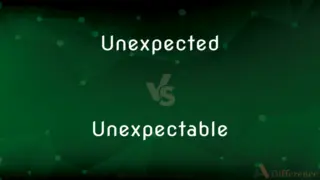
Previous Comparison
Unexpected vs. Unexpectable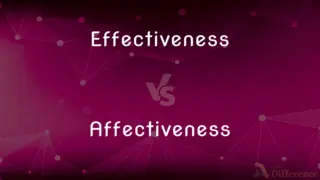
Next Comparison
Effectiveness vs. AffectivenessAuthor Spotlight
Written by
Tayyaba RehmanTayyaba Rehman is a distinguished writer, currently serving as a primary contributor to askdifference.com. As a researcher in semantics and etymology, Tayyaba's passion for the complexity of languages and their distinctions has found a perfect home on the platform. Tayyaba delves into the intricacies of language, distinguishing between commonly confused words and phrases, thereby providing clarity for readers worldwide.


